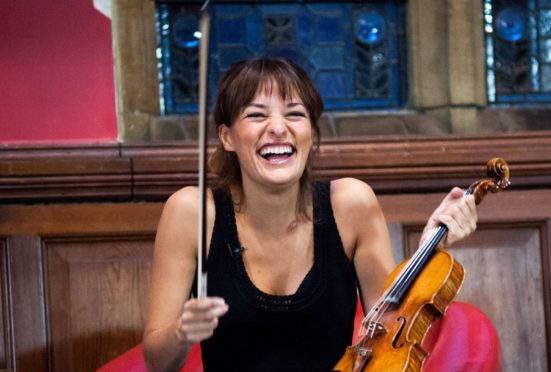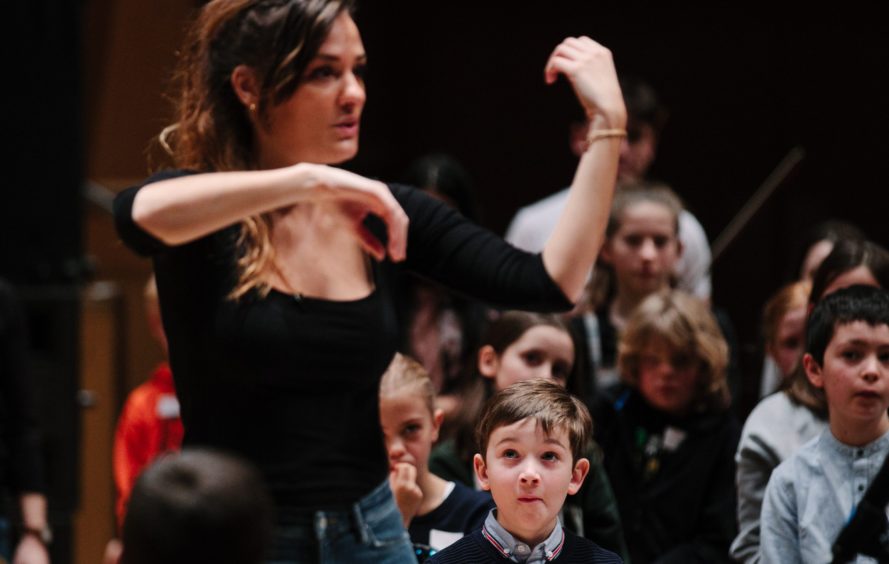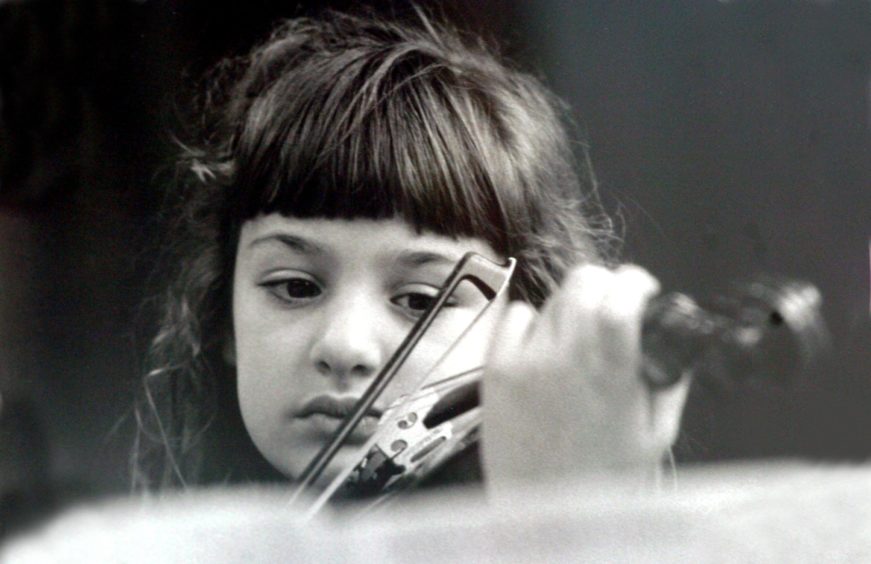
It was half her lifetime ago when Nicola Benedetti was hailed BBC Young Musician of the Year.
That was 16 years ago, and during the ensuing frenetic whirl of playing, recording and educating, the 32-year-old violinist has become one of classical music’s most in-demand performers, criss-crossing the world playing high-profile shows with prestigious orchestras, releasing a string of albums and championing music education.
Already, in recognition, she has been awarded an MBE, OBE and the Queen’s Medal for Music. It has been a breathless schedule that hasn’t given her a moment to pause. Until now.
The coronavirus lockdown has forced Nicola to finally slow down, if not stop entirely, spending more time in her London home than at any point since she left Ayrshire in 1997 to pursue her music education at the Yehudi Menuhin School. It has, she says, been a strange experience.
“I’ve never had a period where I didn’t know what I was doing for this long since I was 14 or 15,” she said.
“That’s what’s been unusual for me, considering how long I’ve been on the treadmill with so many things I can do and lots of options in front of me. Because of that, it gave me a bit of a breathing moment that I would not have had otherwise.
“I’m always saying to myself if I could leave more space between the things I’m doing, that would be better for me. But I don’t know if this experience has made me think I should do that more or less, to be honest.”
Nicola was scheduled to play shows in San Francisco, Australia, mainland Europe and the UK over the next few months. However, these are no longer happening.
“I’m accepting of the fact it will be many more months until I’m back on stage. There’s nothing I can do about it,” said Nicola, who won a Grammy at the start of the year.
“I’ve already cancelled concerts that were three months away. If everything returns, it’s going to be a little bit of a nightmare trying to see what we can schedule back in.”
While not being on the road constantly is a new scenario for Nicola, only having herself for company is not.
“I’m used to that, because all year round I’m travelling all over the place on my own, so I’m used to this type of environment.
“I don’t have a routine of seeing family every weekend or anything like that. The lockdown has, strangely, not been all that revelatory, and I feel part of the reason for that is because I’m used to just working wherever it is I’m working.
“My life is so not routine already, and because of that there is not much that has felt totally different or a real shock to the system.”
Taking a breath at the start of the lockdown only lasted a week or so before Nicola decided to double down on her work for The Benedetti Foundation, her music education charity.
“I thought I would have space during this time and then I made decisions to not have space,” she said. “I’ve always wanted to massively make the most of the foundation’s online activity and make sure we’re as present there as possible.
“Within a very short space of time, we kicked into super gear and by the second week of the lockdown we had a lot of online activity, with big plans for the coming months.
“So much of our remit has been about reaching and inspiring those who otherwise wouldn’t have a high-quality music education, and the fact everything online is free and can be accessed allows that to be possible.
“I feel we have to do much better as a community of musicians who are dedicated to the educating of young people to make the information not just available but easily accessible and to make people aware of its presence.
“Sometimes the most amazing things are out there but if no one knows then who cares if they are there? So we need to do the best we can about that.”
As well as daily and varied classes with a number of Benedetti-approved tutors, there has also been regular “Ask Nicky” live Q&A sessions as part of the foundation’s new online content.
Nicola has been outspoken in the past about music education often being one of the first subjects affected by local authority budget cuts, and she expects more of the same when the economic shortfalls brought about by Covid-19 kick in.
“I think the likelihood of that is quite high, but those of us who are in the music profession and doing OK and surviving OK, I think it will be down to us to support that fight and make up some of that shortfall.
“But it’s not going to be a new battle, that’s for sure. It’s one we all know well.”
Education isn’t the only thing Nicola is focusing on during the lockdown. Unlike many other artists, who have pushed back the release dates of their new albums due to the current situation, she decided to bring hers forward.
Nicola’s album of music by Elgar, one of Britain’s best-loved composers, comes out on May 15 and features his Violin Concerto, one of the most taxing pieces for a soloist, at almost an hour long.
“It’s a really difficult piece, but that’s a lot of the fun of it,” she said. “I only learned it a couple of years ago, and it’s just the most romantic and expressive music.
“We’ve brought the album release forward, because we thought to give something like this in the current time would be a nice thing to do.
“People still want to listen to music and they can, so we should make available whatever’s possible in terms of what people can still access.
“I think this is something people will appreciate right now.
“I’m hoping they take the time during this period to sit and listen to it from beginning to end, to take this moment to appreciate something in a different way and be patient with it.”
Nicola, though, is likely to keep going at 100mph, no matter how long the lockdown lasts.
Relief as workshops beat the lockdown
Nicola says she is grateful to have delivered three music workshops before the lockdown commenced.
She was in Dundee from March 6-8 for the Benedetti Sessions, delivering tutorials to young people and teachers.
It followed on from similar events in Glasgow and London in January and February, although three more planned for Antrim, Manchester and Saffron Waldon have had to be cancelled.
“How phenomenal is it that we got three full sessions, working with thousands of children and hundreds of teachers before all of this happened?” she smiled.
“I feel the timing was so fortunate that we got it all in before everything closed down.
“We’d been working towards this format and schedule for more than a year, so for us, I don’t know what we would’ve done. It would have been the most deflating period, which I’m sure lots of other people have felt, so we’re grateful we got it in before it all happened.”
Across the three weekends, the Benedetti Foundation reached almost 3,000 young people and 200 teachers, ranging from non-musicians to beginner string players and the most promising young musicians.
Participants attended from across the UK, from Shetland to the Isle of Wight.
In Scotland, there were young musicians from 30 of the 32 local authorities with 81% state educated in Glasgow and 70% state educated in Dundee.
“It surpassed all of my expectations,” she added.
“I thought that trying to do something so ridiculously large in scale for the first time would mean a lot of things would go wrong, as it was just me and one other person pulling it all together.
“But we didn’t start or end a single session late, we delivered everything we wanted to, and some of the testimonials we received massively surpassed my expectations with the most overwhelming responses.”

Enjoy the convenience of having The Sunday Post delivered as a digital ePaper straight to your smartphone, tablet or computer.
Subscribe for only £5.49 a month and enjoy all the benefits of the printed paper as a digital replica.
Subscribe © Andrew Cawley
© Andrew Cawley © Shutterstock
© Shutterstock